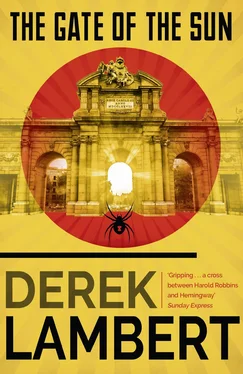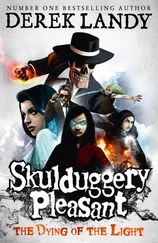Enemy? I don’t know the pilot and he doesn’t know me. Why should we, strangers in a foreign land, try and shoot each other out of the wide sky? He adjusted his goggles which were in no need of adjustment and, with the ball of his thumb, touched the button controlling the little rat’s 7.62 mm machineguns.
Wings beat in the cage of his ribs.
He thought the German pilot of the Heinkel waved but he could not be sure. He waved back but he had no idea whether the German could see him.
His chest ached with the beat of the wings.
Tom learned to fly in the good days, in his father’s Cessna at Floyd Bennett Field, before his father was wiped out on Wall Street in the Crash of 1929.
Those were the days when, without pausing to spare good or bad fortune a thought, Tom had lived with his parents in a 32-roomed mansion at Southampton on Long Island, an apartment overlooking Central Park and a cabin at Jackman in Maine, near the Canadian border, where there was a lake stuffed with trout.
One day’s dealings on the Stock Exchange had erased these visible assets, and a lot more besides. Harry Canfield, self-made and bullishly proud of it, had suffered a stroke and his wife had mourned his convalescence with stoic martyrdom; the Cessna had been sold and Tom had quit Columbia Law School to earn a living.
Unprepared for routine labour, he had not prospered, succeeding only as a bouncer in a speakeasy until five Italians beat him senseless and concluding that period of his life share-cropping in Arkansas. By then he had lived in accommodation no bigger than a garden shed in a coal town in West Virginia and subsisted on soup made from potato peelings, and he had stood in a line in sub-zero temperatures in Minnesota waiting for a meal that had evaporated when he reached the head of the queue, and he had shared a brick-built shack in Central Park with commanding views of the blocks where the more fortunate citizens of New York still resided. And he had become rebelliously inclined.
When civil war broke out in Spain in July 1936, he and some 3,000 other Americans identified immediately and passionately with the Republicans – the workers, the peasants, the people – and crossed the Atlantic to help them fight their terrible, fratricidal battles. Some went through the Pyrenees, some reported to the recruiting centre of the International Brigades in Paris on the rue Lafayette.
Tom was interviewed in Paris by a chain-smoking Polish colonel with a shaven scalp and pointed ears who was reputed to have fought for the reds in the Russian civil war. He made notes in an exercise book with a squeaking pen in tiny mauve lettering.
What were Tom’s qualifications?
‘I can fly,’ Tom told him.
‘Aircraft?’ The colonel stared at him through the smoke rising from a yellow cigarette.
‘Boeings,’ Tom said.
‘Stearmans?’
‘P-26s,’ Tom lied because Stearmans were trainers and this shiny-scalped Pole with the exhausted eyes seemed to know his aircraft.
‘Age?’
‘Twenty-five.’
‘What’s the landing speed of a P-26?’
‘High, maybe 75 miles per hour.’
‘Politics?’
‘None.’
The colonel laid down his chewed pen. ‘Everyone has a political attitude whether they realize it or not.’
‘Okay, I’m for the people.’
‘An Anarchist?’
‘Sounds good,’ said Tom who had not thrown up on a cargo boat all the way from New York to Le Havre to be interrogated.
‘Communist?’
Tom shook his head and stared at the rain-wet street outside.
‘Socialist?’
‘If you say so.’
The colonel lit another cigarette, inhaling the smoke hungrily as though it were food. He scratched another entry in the exercise book. ‘Why do you want to fight in Spain?’
Tom pointed at a poster on the wall bearing the words SPAIN, THE GRAVE OF FASCISM.
‘Tell me, Comrade Canfield, are you anti-poverty or anti-riches?’
What sort of a question was that? He said: ‘I believe in justice.’
The colonel dipped his pen into the inkwell and wrote energetically. The rain made wandering rivulets on the window. Lenin smiled conspiratorially at Tom from a picture-frame on the wall.
‘You were born in New York?’
‘Boston,’ Tom said.
‘Why didn’t you go to Harvard?’
‘I went share-cropping instead.’
‘Please don’t play games with me. You see I, too, lived in New York. You’re no peasant, Mister Canfield, not with that accent.’
‘My father went bust.’
‘So why does the son of a capitalist want to fight for the Cause?’
‘Because bad luck is a two-edged sword, comrade . When we were rich I saw only the sea and the sky; when we went broke I saw the land and I saw people trying to make it work for them.’
‘And did it?’
‘I lived in a shack with a married couple with five kids in a coal town in West Virginia. Know what they paid them with?’
The colonel shook his head.
‘Coal,’ Tom said.
‘What were you paid in?’
‘Ideals,’ Tom said. ‘Do you have any objections to those, comrade?’ thinking: ‘Watch your tongue, or you’ll blow it.’
‘Why didn’t you join the Party?’
‘Which party?’
‘There is only one.’
‘You don’t reckon the Democrats or the Republicans?’
‘There’s not much to choose between them, is there? They’re all capitalists.’
‘What do you believe in, Colonel?’
‘In the class struggle. I believe that one day the slaves and not the slave-drivers will rule the world.’
‘ Rule , Colonel?’
‘Co-exist. But please, I am supposed to be asking the questions. Do you believe in God?’
‘I guess so. Whether he’s Muslim, Buddhist, Jewish, or Catholic. Or Communist,’ he said.
‘The Fascists believe they have God on their side. Maybe you should fight for the Fascists.’
‘Perhaps I should at that.’
‘I’m afraid we can’t allow that.’ The colonel almost smiled and his pointed ears moved a little. ‘You see, we need pilots.’ He leaned forward and made a small, untidy entry in the exercise book.
At first Paris was a disappointment. The inhabitants of the arrondissement where he was staying resented penniless mercenaries on their streets and the other foreigners taking part in the crusade, particularly the Communists, were hostile to an American who, although he had picked fruit in California and collected duck shit at the east end of Long Island for fertilizer, still possessed the sheen of privilege. He was either slumming or spying.
When one Russian on his way to Spain as an adviser – they were all ‘advisers’, the Russians – accused him in a café of being a spy he resorted to his fists, a not infrequent expedient when his tongue failed him. The Russian, a Georgian with beautiful eyes and a belly like a sack of potatoes, fought well but he was no match for the middle-weight champion of Columbia.
‘So,’ the Russian said from between fist-thickened lips, ‘if you’re not a spy what the hell are you?’ He picked himself up from the wreckage of a table.
‘An idealist, I guess.’
‘With a punch like that?’ The Russian shook his head tentatively and touched one slitted eye. ‘Are you reporting to Albacete?’ Tom said he was. ‘Maybe I will become your commissar,’ continued the Russian. ‘I would like that.’ Followed by other advisers, he walked into the rain-swept street.
When the Russians had gone the sturdy bespectacled man in the corner said, ‘So you pack your ideals in your fists?’
Tom, who was beginning to think that ideals could get him into a lot of trouble, said, ‘He asked for it.’
‘And got it. Where did you learn to fight like that?’ His accent was Brooklyn, as refreshing as water from a sponge.
Читать дальше












